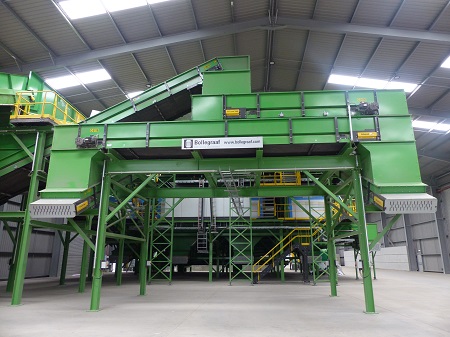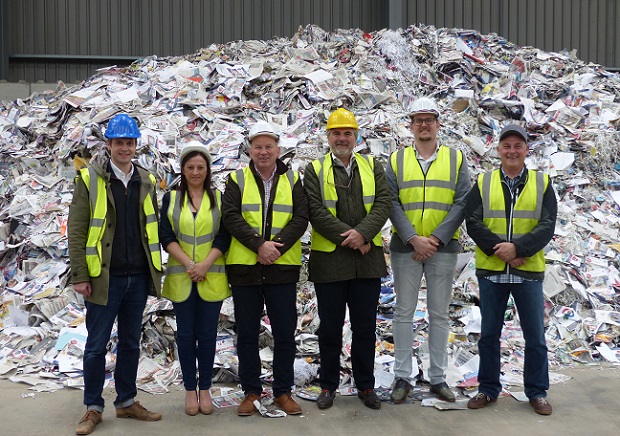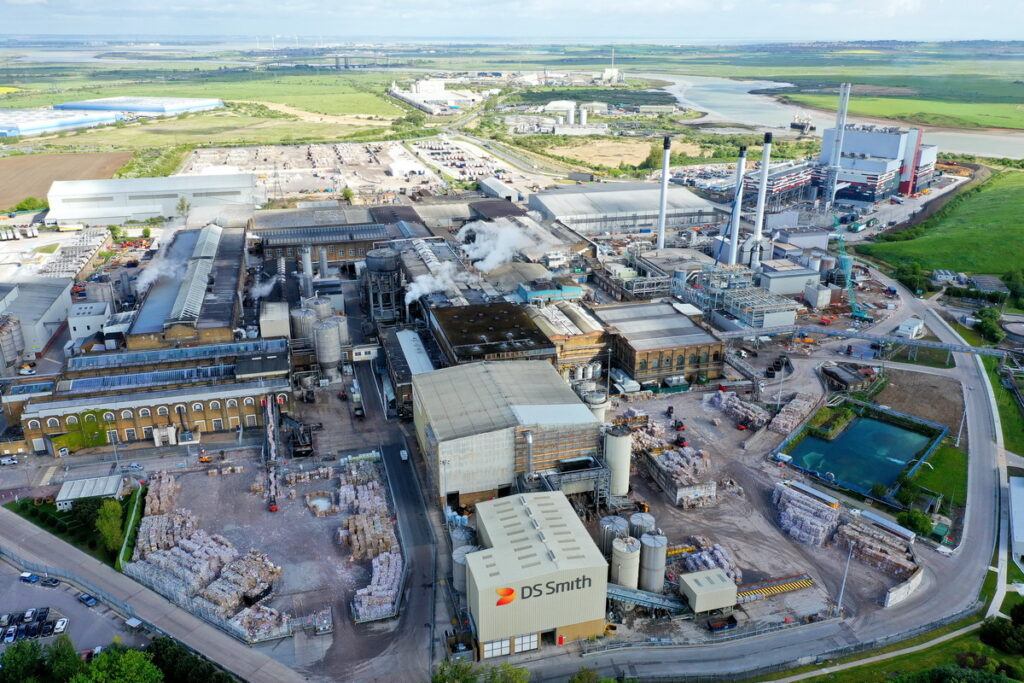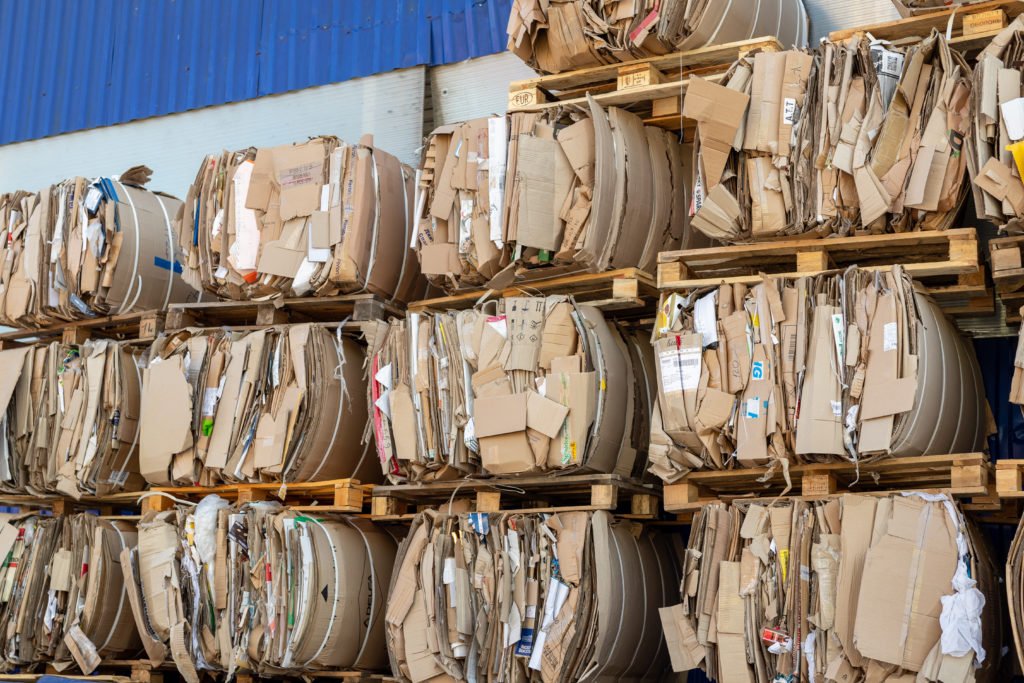The facility, which is noted to be the ‘first of its kind’ in the UK, is set to commence operations next week after securing its environmental permit.

Sited at Windermere Road, the substantial plant will be dedicated to creating high quality recycled paper, the company behind the plant says.
The plant marks a move into the recovered paper market for Ward Recycling. The firm already operates a MRF and a glass recycling plant at its base in Middlesbrough, along with offering kerbside collections throughout the UK.
The facility is also significant for Dutch plant manufacturer, Bollegraaf, as the first dedicated-build project of its size in the UK.
Asian markets
Speaking to letsrecycle.com, general manager at Ward Recycling, Nigel Booth explained that the decision to develop the plant was influenced by the changes in the marketplace for recovered fibre.
As part of the senior management team, Mr Booth oversees operations at the company, alongside a management team that includes his wife, Melanie Booth and Simon Barker.
“Because we’re a smaller company and the China and Asian markets were clearly becoming very difficult to maintain, we felt that we needed to do something in the UK, for the UK,” he says. “That would mean that we weren’t wholly reliant on those markets and we could probably engage with end-users rather than brokers and the like, so it made a lot of sense for us to go down this avenue.”
The plant has already surpassed expectations during testing, claimed Mr Booth, with an “excellent return” of less than half a percent of ‘non-core’ materials in the end product. He said it also has strong green credentials with low energy consumption.
“The plant from that perspective is incredibly good, in truth better than I could have hoped for,” he added.
Plant
The facility encompasses seven Pellenc optical sorters, with a drum feeder and bunker from Bollegraaf, along with an OCC screen and recovery line.
Around 100,000 tonnes is anticipated to be handled each year from local authority source separated paper and card mixture, and a mixed fibre from commingled collections. The company already has a number of contracts in place to take in material but is also keen to work with other local authorities and commercial entities (see letsrecycle.com story).
Mr Booth explains that he is in favour of a dual-stream approach to recycling, with fibre collected separately from other materials, especially glass.

“Fibre is easily damaged,” he says. “Ultimately, the cleaner the product you put through the machine, the longer the lifespan of the machine. If you haven’t got abrasives in there, then there will be less servicing, less maintenance, less downtime, more productivity, cost reduction, better product, higher prices for the material and better quality.”
The build started in August 2018 with Bollegraaf coming on-board in a design role in September. Ebbsfleet Engineering in Kent was contracted to fit the plant.
“I’m immensely proud of what we’ve achieved in a short period of time,” says Mr Booth.
Partnership
He feels by working in partnership, Ward Recycling and Bollegraaf have been able to deliver a quality installation. This is, in part, down to effective communication between the teams.
Praising the working relationship between the companies, Charles Daridon, global sales director at Bollegraaf, says: “All the teams have communicated very well together and the job has been done very well.
“It’s one of the most efficient paper plants that I’ve seen and it’s been very interesting to see how we can collaborate with the whole team at Ward,” he said.
Luc Malinger, sales manager, UK & Ireland at Bollegraaf, added that the plant is designed to ‘bridge the gap’ between the users and the recyclers.
“It’s an efficient way of cleaning the material if you can have a plant that is specialised,” Mr Mallinger said. “It has happened with plastics a few years ago and those plants are becoming popular.”
This perspective is echoed by Mr Booth. “From our point of view, the idea around it all was to become more self-sufficient, less reliant on world market places, but to be efficient,” he said. “And clearly to churn out a clean product as quickly as possible and I think we’re there.”
And, Ward Recycling will be looking to replicate this approach with other commodities going forward, such as glass, he suggested. “I think this should be our philosophy moving forward with other things, because world markets are volatile and we need stability, especially as a smaller company.”
‘Flexibility’
The plant allows the firm to cope with changes in the market, it says, allowing flexibility with the proportions of material it handles.
On the optical sorters, Bollegraaf’s Mr Mallinger explains: “These machines are very flexible; you can change the settings as your material evolves over time. The material in five years may be quite different because of consumer habits. The plant can cope with those changes, quite easily actually.”
Mr Booth adds: “I think that’s one of the better aspects, the flexibility of what the plant can do. That’s got to be recognised when we talk about the design from the outset.”
Looking ahead, Mr Booth explains: “I think it’s about being that stepping stone that gives you the ability to specialise in a material and I think that’s where the market place is going to go.
“Because even if you do keep exporting it’s clear that the quality of the export has to be so much higher to be able to have confidence in what you’re doing.”











Subscribe for free